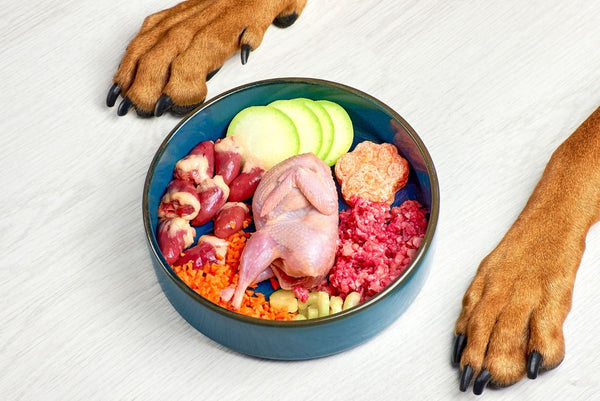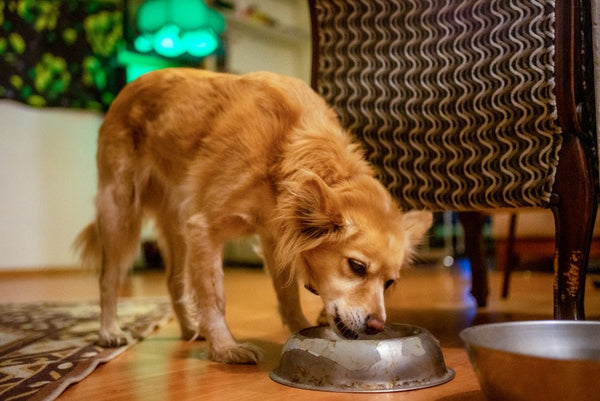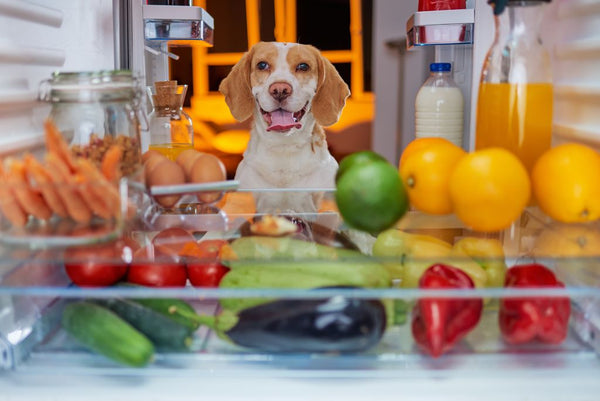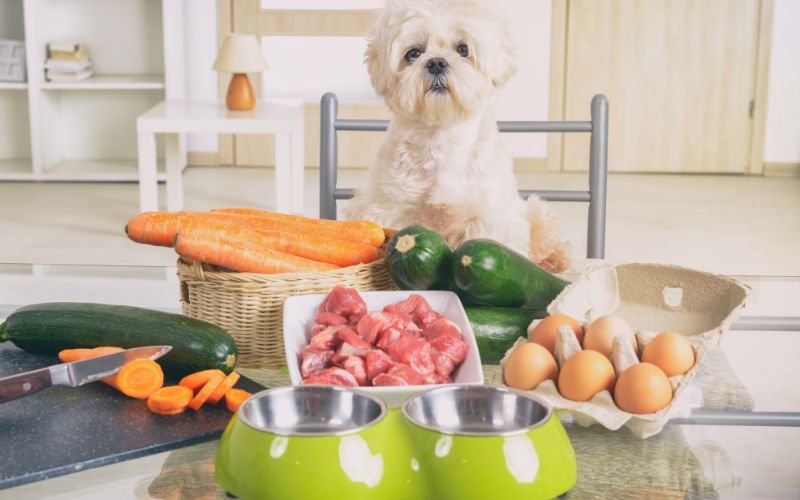As a committed pet parent, we know that one of your top priorities is ensuring your canine companion receives all the nutrition they need in their diet. The principle we tend to follow when we’re making dinner for our dogs is that their food should have variety, a healthy portion of the appropriate food groups, and shouldn’t take hours to prepare (as this simply isn’t sustainable.)
The way we do this by essentially making their dinner, our dinner. Whatever we are planning to make for ourselves that evening, we will tailor it towards our dogs, making sure that it is full of goodness. We can then give them a healthy meal whilst adding our own seasoning afterwards - as this way, we know our dogs are receiving high quality ingredients on a daily basis.
And not only is this great for your dog, it is also wallet-friendly.
For example, tonight we are all having roast chicken and vegetables. Between our two dogs, we will probably make it through ¼ of a small chicken (with the bones removed, of course), coming to around $3 total, and then vegetables on top of that would likely be around 50 cents for both their portions. For a family with small dogs this works out quite nicely and can save you a bunch of money.
This is just an example of how you can provide your pups with easy homemade dog food. So let’s now take a closer look at how to create balanced meals for your dogs, what a healthy diet for dogs should consist of, as well as tips and tricks on how to supplement your pooch’s food dinner with goodness.

What is a healthy dog diet
Dogs have different dietary needs to humans, and a lot of dogs won’t be receiving the levels of nutrients that they need to thrive. Having an idea of your dog’s basic nutrient needs and what they receive through their food should be a priority when it comes to structuring a well-rounded dog diet.
Carbs and protein are two of the main contenders here. Dogs tend to be very active animals who spend a lot of time walking, running and playing. Carbohydrates are essential to maintain high levels of energy, while protein works its magic with muscle maintenance. Calcium is also super important to help keep their bones and teeth strong and healthy.
Here are some of the main food groups to consider when building a homemade diet for your dog:

Fruit and veg
Of course we all know about the health benefits of fresh fruits and veggies, and it is no different when it comes to our dogs. They are packed with texture, crunch and vitamin goodness that will keep your dog both satiated and stimulated. More water-dense fruits and veg can also be a great source of hydration for your dog, especially during the summer months.
TOP TIP: Why not try giving your dog some raw veggies in place of normal processed dog treats. These are just as tasty, with even better health benefits.
Meat and fish
Dogs are known to have a love for all things meaty, and rightly so. Meat and fish pack a powerful protein punch to help keep our dogs energised and their muscles in top condition.
There are several fish that aren’t safe for dogs to eat, but those that are can be an excellent source of omega-3 fatty acids, helping to decrease inflammation and keep their skin and coat looking silky.
Grains
Carbohydrates are the perfect energy source, and bulking your up’s dinner out with a healthy dose of natural grains will help keep them fuller for longer, offering them long-lasting energy for playtime and walkies. And not only this, grains are a good source of healthy fats and antioxidants!
Bones
Dogs and bones go together like birds of a feather, being both a brilliant attention stimulant and tasty treat that helps promote healthy teeth and gums. However these should only be given occasionally - in other words, your dog should be surprised to be given one and it shouldn’t be the norm.

Make your own dog food
Want to learn how to make the best homemade dog food? We’ve got you covered.
Making dog food doesn’t have to be complicated or time consuming, however it is important to be clued up on the basics:
Keep it simple
Your dog’s dinner doesn’t need to be a 5 star dining experience; all that is needed is a representation of all the appropriate food groups, paired with some good texture and flavour. Dogs are known to eat almost anything, and so as long as you're using healthy, wholesome ingredients you can’t steer far wrong.
Consider your dog’s individual needs
Every dog is different, and depending on size, breed, age and health condition your canine companion may require different levels of nutrition, a little more of this and a little less of that. If your dog has specific needs or you are unsure what foods may have an adverse effect on your pup, consult your vet for further guidance.
Double check everything is dog-safe
While dogs tend to have a pretty strong stomach, there are a lot of foods which can make them poorly. Always do your research before feeding anything new to your dog, particularly avoiding excess fat and seasoning as this can considerably upset your dog’s system.

Supplements for dogs
Let’s be honest, we may not always have the time to perfectly balance our dogs’ meals, and may even need to rely on pre-made dog foods from time to time.
Lucky, there is something that can help give your pups a little extra boost of goodness.
Our Wellbeing Essentials Complete 22 is a high quality wholefood supplement that can be added to your dog’s daily meals, specially designed to help replace any missing micronutrients in a canine diet. It can be eaten raw or mixed in with other foods, or added to meals which have been cooked. No matter how they eat it, it’s going to do the world of good!
All you need is a daily measurement and your dog will be receiving:
- Vitamins and Minerals, including Trace Minerals
- Essential Fatty Acids
- Antioxidants
- Supported Good Gut Health with Prebiotics, Lignans and Dietary Fibre
- A natural anti-inflammatory which can be safely used in conjunction with therapeutic veterinary care.
Sounds pretty great, right?
Stay tuned for more tips and tricks on how to keep your dog happy and healthy - the more you know!

In Conclusion
When it comes to making homemade meals for your dog, the key is high quality ingredients, simplicity and variation.
Before making any drastic changes to your dog’s diet, we would highly recommend checking in with your vet who will be able to provide advice on any transitions and what style of diet is best for your canine companion.
Remember, cooking for hours may not be practical for every pet parent, so ensure that whatever decisions you make for your dog’s diet are sustainable and something you’re committed to maintaining, to support their long-term health.
And don’t ever hesitate to reach out if you’d like our help or advice!



